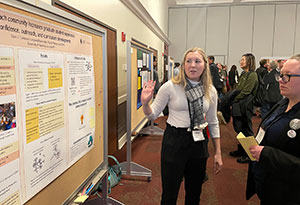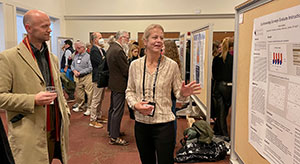
Seven Learning Actively Mentoring Program (LAMP) educators from the University of Wyoming and Laramie County Community College recently presented projects at the Original Lilly Conference on College Teaching at Miami University in Oxford, Ohio.
LAMP, part of the UW Science Initiative, is a comprehensive, sustained mentoring and professional development program. LAMP emphasizes how to best adopt active-learning strategies in large-scale active-learning classrooms. The Original Lilly Conference on College Teaching is among the nation’s most renowned conferences presenting the scholarship of teaching and learning (SoTL).
“Every member of the LAMP learning community shared an evidence-based project that showcased and simultaneously modeled student-engaged pedagogy,” says Rachel Watson, UW Science Initiative LAMP director. “Their sessions were exemplar at a conference of highly capable SoTL scholars.”
Watson and Christi Boggs, a senior lecturer in UW’s Ellbogen Center for Teaching and Learning, were the lead educational developers for the LAMP participants’ SoTL research, and both also presented at the conference.
Presenting at the recent conference and their projects were:
-- Boggs focused on choice-based design and assessment of her “Queer Theory” course. Watson presented a high-impact capstone course that enables students to conduct their own field- and lab-based research in partnerships with community collaborators, such as with Wyoming public health labs.
-- Claire Campion, a zoology and physiology graduate student from Rochester, Minn., and the only UW student presenting at the conference, discussed the launch and growth of a grassroots graduate student outreach group called COPSE (Community Outreach Program on STEAM Engagement). Campion assessed the changes in graduate student motivation for outreach over time and also analyzed the way in which the social network of COPSE changed after two years of active outreach.
“As a graduate student, this experience instills the importance of being a lifelong learner and encouraged me to pursue teaching as I graduate with my master’s degree next month,” she says. “This experience also showed me the support and resources that exist as I continue to grow as an educator.”
Her presentation poster can be viewed at https://drive.google.com/file/d/1VftUrwVg-fjxPQZV6R3BGRWAw6o-H6Ds/view?usp=sharing.
-- Kira Heater, a Laramie County Community College mathematics instructor, led an active-learning session using a taxonomy of significant learning developed by educational scholar Dee Fink. The presentation assists educators in beginning their courses by asking an important question about “what we want our learners to be able to do after completing our courses.”
“The value of getting to appreciate other instructors’ work, to be introduced to new ideas about teaching, to examine your preconceived notions about students, and to ponder and discuss ways to improve both personally and professionally is immeasurable,” Heater says. “Presenting in this environment helped me build more confidence in sharing my work and teaching values. An unanticipated benefit of Lilly was participating in active learning and getting a better understanding of the student perspective of group work and conversation. This will help me both with techniques to use during class and in thinking about how to improve my students’ experience in active learning.”
Heater’s session, titled “Beyond Content: Examining Your Teaching Values,” can be viewed at http://celt.miamioh.edu/lillycon/presenters.php?session=11107&year=2022.
-- Rhiannon Jakopak, a UW Haub School of Environment and Natural Resources assistant research scientist, discussed her journey to assess students completing field-based fellowships in the Haub School. She used knowledge surveys that ask students to self-assess their competence, which allow students to consider what they know and promote instructor preparedness and communication with the students about course content.
“Attending the Lilly Conference was a highlight of my year -- being surrounded by professionals who are committed to doing their best to help their students learn was invigorating and inspiring,” Jakopak says. “I am excited to implement many new techniques into my classroom, not the least of which include strategies to more specifically cultivate critical thinking, additional ways to assess what students have learned and create technology agreements to guide behaviors in the classroom.”
Jakopak’s session, titled “Self-Assessing in the Field: Knowledge Surveys as Tools to Assess and Structure Fellowships,” can be viewed at http://celt.miamioh.edu/lillycon/presenters.php?session=11047&year=2022.

-- Ginka Kubelka, a UW associate lecturer of chemistry, has implemented a type of active learning -- team-based learning -- in her organic chemistry courses. She used knowledge surveys to assess students’ changes in self-assessed competence.
“I was able to present my work and engage in many conversations with wonderful people who were supportive and open to sharing their experiences,” Kubelka says. “These days of listening, exchanging ideas and learning were so inspiring. I am excited about implementing new components into my teaching to improve student learning.”
Her presentation, titled “Can Knowledge Surveys Evaluate Instructional Methods?,” can be viewed at http://celt.miamioh.edu/lillycon/presenters.php?session=11048&year=2022.
-- Diksha Shukla, a UW assistant professor of computer science, presented on the implementation of student learning communities in her courses on artificial intelligence (AI). Students engage in asynchronous discussions about AI current topics, and they holistically integrate their course learning and literature knowledge with learning in other classes. Shukla assesses their work by monitoring curiosity scores.
“The experience provided new energy and inspiration to implement research-based practices in my classroom to elevate the student learning outcomes and the overall learning experience,” Shukla says.
To learn more about Shukla’s work, visit http://celt.miamioh.edu/lillycon/presenters.php?session=11062&year=2022.

